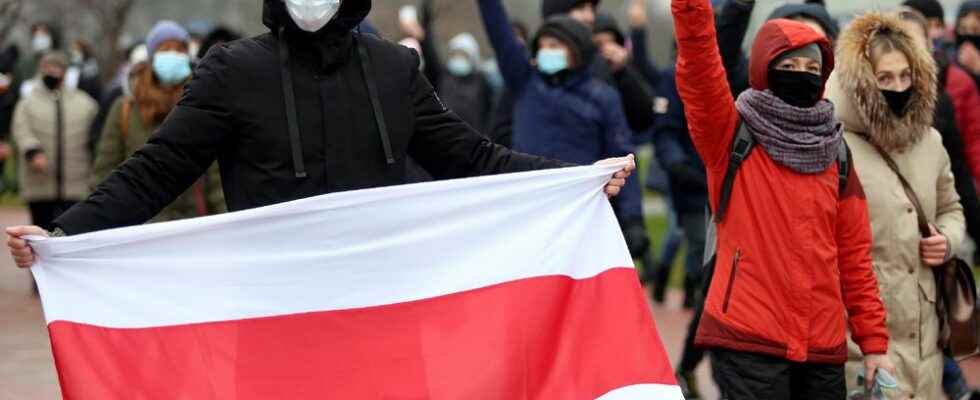It’s a sycophant number that Belarusian President Alexander Lukashenko is now used to. Thursday, June 30, when welcoming Sergei Lavrov in Minsk, he was delighted, in front of the cameras, to “meet the best diplomat in the world”, with a strong embrace, salamalecs and deferential laughter under his mustache. For his part, the Russian Foreign Minister, more sober, refrained from any reciprocity.
Supported without restraint by Vladimir Putin after the presidential election of 2020, on which weighs strong suspicions of fraud, Lukashenko now complies with all the wishes of his neighbor. The rise of tensions between the West and Moscow and the war in Ukraine are only accelerating the vassalization of his regime, reduced to playing stooges.
Five days before his meeting with Lavrov, Lukashenko had thus made the trip to Saint Petersburg. Vladimir Putin had summoned him there to celebrate the 30th anniversary of the opening of diplomatic relations between their two countries… exactly when the seven powers of the G7 (Germany, Canada, United States, France, Italy, Japan and United Kingdom) met in Germany to talk about the war in Ukraine.
“Lukashenko is isolated”
During a staged show broadcast on television, Lukashenko asked his Russian godfather to help him respond to the “aggressive” and “conflictual” policies of his European neighbors, Lithuania and Poland, also citing alleged “flights of NATO planes carrying nuclear weapons” at its border. In response, the master of the Kremlin promised him missiles capable of receiving atomic charges “in the coming months”. A new episode in the escalation of threats to the West, while Lithuania has imposed restrictions on transit between Russia and the exclave of Kaliningrad.
This is not the only signal sent that day by Moscow. In the early morning, bombers that took off from Russia fired a dozen missiles at Ukrainian targets from Belarusian airspace. The maneuver came as a reminder that it was from this territory that the Russian army led the invasion of the entire northern part of Ukraine, towards kyiv and Chernihiv, before withdrawing at the end of March to concentrate its forces on the Donbass.
“Since the repression of demonstrations against his regime, Lukashenko has been isolated and Putin remains his only partner, underlines former Belarusian diplomat Pavel Slunkin, researcher at the European Council on International Relations. Without his military and financial support, he would not have survived. But the price to pay to stay in power is to no longer be an independent actor, but Putin’s puppet.”
“People’s Militia”
So far, Putin has not demanded that his vassal send troops to Ukraine. “To take control of kyiv, Putin thought he didn’t need Belarusian soldiers, who weren’t prepared for such an operation anyway,” said Pavel Slunkin. However, Lukashenko said he was ready to send them as soon as the invasion broke out on February 24. Since then, recognizing that the offensive “draws on”, he calls for peace…while preparing for war.
Protesters opposed to Alexander Lukashenko march through the streets of Minsk on November 22, 2020.
afp.com/Stringer
Minsk thus announced the creation of an operational command in the south of the country, as well as a “people’s militia” to reinforce the regular army (45,000 soldiers) and the territorial defense forces (120,000 men), part of which conducts training exercises near the Polish border. “That does not mean that it will send troops to fight in Ukraine, but it is better able to do so than last February,” said Pavel Slunkin.
But is this really Lukashenko’s will? Not so sure. It can thus be noted that Belarusian public opinion has not been prepared for such an intervention, as has been, since 2014 and the Maidan revolution, that of Russia. Admittedly, the television news in Minsk relays the propaganda speeches on the necessary “denazification” of Ukraine and the alleged responsibility of the West. “But it’s never the main subject of the newspapers, not even the 2nd or the 3rd”, specifies Pavel Slunkin.
Towards an annexation of Belarus to Russia?
Before the invasion, a survey from the Chatham House think tank showed that only 13% of Belarusians wanted to send troops to support Russia. On Belarusian territory, dozens of sabotages were carried out against the railways used by the Russian army to transport its equipment. “However, the most risky, politically, for Lukashenko, remains to antagonize Putin. If he asks him, he will therefore send troops, even if it means provoking a new wave of discontent”, considers Pavel Slunkin.
Will the process of vassalization go as far as pure and simple integration of Belarus into Russia? The diplomat does not believe it: “If the Putin regime survives the war in Ukraine, Lukashenko will have to cede more and more sovereignty to Moscow, but it will not go as far as annexation.” A throwback to the time when Belarus was one of the fifteen member republics of the USSR. And saw his fate decided directly in the Kremlin.
